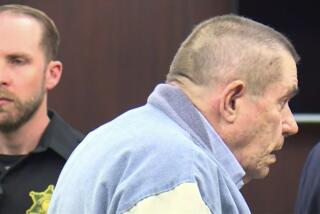George Zimmerman’s bail set at $150,000 in teen’s shooting
ATLANTA — George Zimmerman apologized to the parents of the unarmed black teenager he fatally shot, as a Florida judge set his bail at $150,000, offering the former neighborhood watch volunteer a path to freedom after more than a week in jail.
By midafternoon Friday, Zimmerman was still in custody, but his freedom was “being worked on as we speak,” said Jimmy Woods, a spokesman forMark O’Mara, Zimmerman’s attorney.
Zimmerman, 28, appeared in the Sanford, Fla., courtroom at 9 a.m. in a dark suit and gray tie, his hair in a buzz cut, his hands bound by a chain circling his waist. Almost two hours into the televised proceedings, O’Mara announced that Zimmerman wished to take the stand.
He spoke calmly, his voice betraying no emotion.
“I wanted to say I am sorry for the loss of your son,” Zimmerman said, addressing the parents of 17-year-old Trayvon Martin, who were in attendance. “I did not know how old he was. I thought he was a little bit younger than I am, and I did not know if he was armed or not.”
Zimmerman turned himself in to authorities on April 11 after learning he would be charged with second-degree murder for the February incident. He had reported Martin to police as a suspicious character, and later followed him after a police dispatcher told him that wouldn’t be a good idea.
What happened next, and in what sequence, is a matter of dispute at the heart of a case that has touched off protests and moments of reflection about race and the American justice system. Zimmerman is half white, half Peruvian; Martin was black.
Stray pieces of that puzzle have been trickling out, the latest being a photo obtained by ABC News that shows blood on the back of Zimmerman’s head. The photo was reportedly taken shortly after the shooting. Zimmerman contends that he shot Martin in self-defense after the teen attacked him and beat his head into the sidewalk.
Seminole County Circuit Judge Kenneth Lester Jr., set Zimmerman’s bail after a sometimes-contentious hearing. Attorneys for the state repeatedly brought up two incidents from Zimmerman’s past, both from 2005. The first was an arrest on suspicion of assaulting an undercover officer during an underage-drinking crackdown, and the second was an injunction sought by a former girlfriend who claimed Zimmerman had struck her.
“It’s not somebody who’s never been in trouble with the law before,” prosecutor Bernardo de la Rionda said. He added that Zimmerman, who had cooperated with authorities while in hiding, was a heightened flight risk now that he was facing a possible life sentence. He asked the judge to either deny bail or set it a $1 million.
In the end, however, Lester determined that the 2005 incidents were relatively minor. He granted bail with numerous conditions, including an order that Zimmerman not contact any potential witnesses — a group that includes Martin’s parents — and a requirement that he wear an electronic global positioning device so that authorities can track his location.
Zimmerman also surrendered his passport.
O’Mara argued that his client needed to remain in a secret location because of threats on his life. O’Mara also asked Lester whether his client could be allowed to leave the state. The judge told the attorney to try to work those details out with law enforcement authorities.
The hearing may have also offered a preview of some key questions that will arise at trial. O’Mara grilled one of the investigators for the state attorney’s office, Dale Gilbreath, who helped prepare the probable cause affidavit that was the basis for Zimmerman’s arrest.
The affidavit says Zimmerman “confronted” Martin, after which a struggle ensued. O’Mara questioned the use of the word “confronted.”
“Do you know who started the fight?” he asked the investigator at one point.
“Do I know? No,” Gilbreath said.
“Do you have any evidence that supports who may have started the fight?”
“No,” Gilbreath said.
O’Mara called Zimmerman’s wife, mother and father as witnesses to vouch for his character and try to convince the judge that Zimmerman was not a flight risk. All three testified by phone, fearing a public appearance after reported threats against the family.
“I’ve never known him to be violent at all unless he was provoked, and then he would turn the other cheek,” said his father, Robert Zimmerman Sr.
Benjamin Crump, an attorney for the Martin family, dismissed Zimmerman’s apology as self-serving. Crump said that on a website Zimmerman established to help raise legal and living expenses, Zimmerman “never once said ‘I’m sorry,’” Crump said at a news conference. “Why today?”
More to Read
Sign up for Essential California
The most important California stories and recommendations in your inbox every morning.
You may occasionally receive promotional content from the Los Angeles Times.










